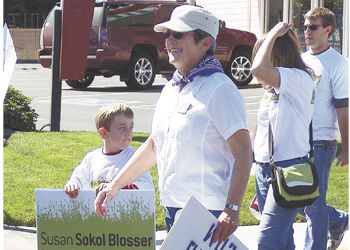A Reluctant Warrior

By Hannah Hoffman
Susan Sokol Blosser stands under a campaign tent at Dundee’s Party in the Park, talking to a voter. She shifts her weight from sneakered foot to foot, arms crossed.
She listens intently. Reserved by nature, she limits her responses to filling the voter’s pauses with the occasional “yep” and talking up the importance of working both sides of the legislative aisle in search of compromise.
That’s not emblematic of most candidates, but it’s a hallmark of hers. She’s an avid listener who doesn’t much like the limelight. Despite two previous campaigns, she’s still not at ease glad-handing, working a crowd or leading a rally.
Sokol Blosser becomes more animated, though, when the topic turns to the man she’s trying to unseat, Yamhill Republican Jim Weidner. After all, he’s what led her to overcome her reluctance and challenge him.
Weidner took a “no new taxes” pledge before the Oregon Legislature’s 2009 session, his first representing House District 24. And he stuck to it religiously.
Sokol Blosser was sharply critical, saying lawmakers need the freedom to make thoughtful decisions. They shouldn’t issue ideological proclamations and lock themselves into ideological straightjackets in advance, she said.
Sokol Blosser, who has made her living in the wine industry, lives that philosophy for the most part. She rarely becomes animated, rarely waves her arms or clenches her fist, rarely lets out a hearty laugh. She’s more comfortable behind the scenes than out front making them.
On the campaign stump, she reads her speeches. She maintains an even cadence, giving each word its moment on the stage.
An avid reader — she just finished “Eaarth,” by Bill McKibben, a book that requires the reader to envision an as-yet unseen future for the planet — Sokol Blosser collects quotes she likes on Post-it notes and frames her computer screen with them. In the background, encyclopedias of additional quotes repose on office bookshelves, waiting their turn.
The woman is a thinker. She likes to ponder and reflect.
To that end, she gets up early in the morning to build in some time alone with her thoughts.
She is semi-vegetarian — fish, yes; beef, no — just because she considers it the right thing to do. But she admits seriously missing cheeseburgers.
Sokol Blosser thought long and hard before committing to the run against Weidner. She made two attempts in the 1980s, one of them for this very seat, and lost both times. She took the losses hard and dropped out of politics to focus on building her business.
That business is the highly regarded, successful Sokol Blosser Winery, which helped blaze the trail for many in the industry. It’s demanding to run, but she’s through with that. She passed it on to her children, Alex and Allison.
Sokol Blosser served on the Dayton School Board for eight years when her children were young. A longtime leader in the wine industry, she helped found the renowned International Pinot Noir festival. And she took the time to author a memoir.
But she hadn’t ventured onto the political stage for more than two decades. So it wasn’t an easy decision for her. She said she took a hard look a House District 24 and didn’t like what she saw.
The district, which takes in the most of Yamhill County and a sliver of northern Polk, hadn’t had the best representation in recent years, she said.
Having spent virtually her entire adult life as a farmer, raising grapes, and as a small businesswoman, marketing wine, she felt ideally suited for the largely rural district.
She has gotten strong encouragement from House Speaker Dave Hunt. The Gladstone Democrat has appeared at many of her events and helped her canvass the district, even though he has a race of his own to run.
That switch may stem in part from Hunt’s very public displeasure with Weidner and his performance in the 2009-10 legislative sessions. He was particularly disappointed with Weidner’s about-face on a transportation package designed to provide $192 million for a project in his own district — the Newberg-Dundee Bypass. Weidner voted for it in committee, then reversed and voted against it on the floor.
That led Hunt to strip the Yamhill freshman of his seat on the Transportation Committee. And it probably played no small part in his decision to donate $3,000 of his campaign money to Sokol Blosser.
The Democratic caucus has been even more generous. It has donated $4,000 in cash and $33,500 in staff support, the latter booked as in-kind contributions. But Sokol Blosser has proved a highly successful fundraiser in her own right. So far, she has raised more than $200,000 in cash contributions alone. And in-kind contributions would increase that amount to almost $300,000.
While Sokol Blosser has had plenty to say about Weidner’s positions and performance, his supporters have found ammunition for return fire in her 2006 memoir, titled “At Home in the Vineyard.”
It chronicles the founding and development of the family vineyard and winery. Along the way, it tells the story of her divorce from Bill Blosser, her marriage to company winemaker Russ Rosner, her two failed runs for office and her gradual transfer of the business into the hands of her children.
In the book, she is candid in detailing challenges she faced on both the personal and business sides of her life. It is full of nuance and personal reflection offering insights into her thinking.
Opponents have tried to capitalize on it, sometimes indirectly and behind the scenes, sometimes directly and publicly. And they have focused on her business, which she considers patently unfair, particularly now that it’s being run by her children.
On at least two occasions in June, placard-carrying political opponents gathered at the bottom of the winery driveway, potentially to drive away weekend business during the peak summer season. Some of the signs attacked the winery directly, suggesting it should not be patronized.
This fall, members of Oregonians for Immigration Reform arrived to picket with signs accusing the winery of hiring illegal immigrants under Sokol Blosser’s direction. They contended a vote for her would be tantamount to advocating illegal immigration.
Then Alex Sokol Blosser, winery co-president with his sister, caught a film crew trespassing on vineyard property to shoot an attack video. He said the camera was aimed at a woman standing in the vineyard brandishing his mother’s memoir and asserting his mother had a history of hiring illegal immigrants.
Conservative activists have also posted personal attacks on the Facebook page of Neal Lockhart’s Conservative Friends of Yamhill County.
All the attacks have been based, at least loosely, on passages from the memoir. However, the excerpts have been subjected to various degrees of extrapolation, interpretation and speculation along the way.
Weidner has denied any involvement in — or even knowledge of — any of this. In fact, he publicly criticized the film crew’s intrusion onto private property.
Sokol Blosser has condemned the intrusions into her personal and business life. She has also disputed the accuracy of the various claims, taking particular aim at an allegation that she knowingly hired illegal workers in the 1980s.
She said every worker ever hired for her vineyard and winery operation has presented the required state and federal paperwork. She said the problem is that everyone knows it’s not always genuine, but there was no way to tell in the 1980s, and it’s still not easy today.
Sokol Blosser devotes only a few paragraphs to the issue in her book. They are part of a passing reference on a single page.
In the passage, she indicates industry insiders knew many workers were illegal, as forged documents were widely available. But she makes no statements about anyone, certainly not herself or members of her family, hiring workers whose documents were known to be false.
When the issue surfaced in the campaign, she released a statement saying she had always obeyed the law in her business dealings, and her children were following in her footsteps.
While Weidner is focusing his campaign largely on shrinking government and government spending, as he did two years ago with great success, Sokol Blosser is focusing hers on advocacy for small business and agriculture in a body dominated by urban interests. She says she has the ability to work both within her own caucus and across the aisle, thus being doubly effective.
One of her largest campaign fundraisers was a dinner party held in her winery’s production cellar. The Bounty of the County dinner featured a catered meal consisting entirely of food grown on small, family farms in Yamhill County.
The cellar ceiling was strung with tiny white twinkle lights, which glittered off huge steel vats used for winemaking. Long tables seated more than one hundred friends, family and supporters, who passed dishes down one to another, Thanksgiving style.
The fare ranged from chicken breasts and lamb chops to farm-fresh vegetables and peaches with cream, all harvested within the confines of House District 24.
The local farm-to-market phenomenon is one Sokol Blosser embraces heartily. She finds it invigorating.
She regularly emphasizes the importance of small farms to Oregon’s economy. By selling their products locally through farmer’s markets and community-supported agriculture networks, she said, they turn the name of a family and a farm into a brand — and make a profit doing it.
These farms follow the same business model as Oregon wineries, which operate on a boutique scale in comparison to giant California companies like Gallo. She sees it as something deserving strong encouragement in the agriculturally rich Willamette Valley.
And she harbors similar hopes for small businesses of other types. She thinks that’s largely where Oregon’s recovery lies.
But she joins many Republicans in saying small businesses need a more streamlined regulatory climate and system.
It shouldn’t be as hard to start a small business as it currently is in Oregon, she said.
She’s made that case to leaders in her own party. If elected, she thinks she could wield real influence with them as a small businesswoman and farmer of like-political affiliation.
She also argues that taxes and fees need to be scaled to the size of the business. Small farms and businesses shouldn’t be expected to pay the same proportion as giant out-of-state corporations, she said.
She supported Measures 66 and 67, the twin tax increases voters passed in January, but says she did so with great reluctance. If elected, she would support adding a sunset clause and revising provisions like the gross receipts tax.
Though her campaign is well funded, she has made door-to-door canvassing a centerpiece. She said that benefits her as much as it does voters seeking insights into the candidates because it serves as a reality check.
“In campaigns, you tend to surround yourself with people who agree with you,” she said. But going door to door, you often encounter people who don’t.
You need that, she said. You need to test your ideas.
On one recent outing, an older man raking gravel in his driveway welcomes her warmly at first, then asks her what party she represents.
When she says she’s a Democrat, that’s it for him. He’s done listening.
That’s all he needs to know. “Democrat, that’s a no-no,” he says.
She tries to engage him anyway, but he will have none of it. “We don’t want the Democrats in power,” he says.
At other houses, people are more welcoming.
Some listen, ask her questions and engage in banter with her without committing their votes. Others eagerly assure her they’ll be checking “Sokol Blosser” on their ballots.
She occasionally takes her campaign to community events, though she said she’s stuck primarily to Dayton and Dundee, where she has natural roots. As a consequence, she missed many of the community festivals held around the county over the summer.
She did march in the Dayton Harvest Festival parade, accompanied by her campaign staff and an assortment of relatives.
She marched in the attire in which she typically canvasses — blue jeans, a T-shirt and a purple bandana. Her short gray hair and glasses are the only elements of her appearance that suggest she’s a grandmother.
Two of her grandchildren, 8-year-old twins Nikolas and Avery, walked with her in the parade. They carried an American flag and a Sokol Blosser campaign sign. They were excited about the opportunity and expressed it by giving Grandma a series of hugs.
Sokol Blosser didn’t actually carry one of her own signs. Instead, she carried a white placard that read, “Protect Grand Island.”
She is avidly supporting the farmers of Grand Island in trying to fend off a 174-acre gravel quarry proposed by Baker Rock Resources. It’s a local, not a state, issue, but it resonates with her on the state level.
Campaigning is clearly not Sokol Blosser’s comfort zone. She talks to people easily, but has moments of discomfort when they agree or disagree too vehemently, or even when their dogs seek attention too enthusiastically.
She eschews the spotlight even at her own events.
At the Bounty of the County dinner, Sokol Blosser gave a short welcoming talk. Later in the evening, she bookended that with another brief presentation.
She typically speaks in the same measured tones, whether she’s addressing a crowd from a podium or visiting with someone in his or her living room.
However, she falls into a more natural flow when she’s on the phone — a good medium for her. She has a landline with a headset at the ready, along with an iPhone, featuring a novel cricket-chirp ring tone.
During an interview, she suddenly bounds upstairs in search of a favorite quote she has scribbled on a Post-it in her office.
That office obviously serves as a treasured refuge for her, full of meaningful mementos.
A needlepoint wall hanging features a bunch of grapes by a window overlooking a valley full of vineyards and trees. It carries the date 1974 and the name P. Sokol.
The latter is a reference to Phyllis Sokol, Sokol Blosser’s mother.
As she scrambles to find the quote she’s looking for, she explains that her parents were instrumental in helping her and Bill get the winery off the ground. That wall hanging serves as a constant reminder of the support they provided, she says.
The sun has set. A desk lamp and two overhead lights illuminate modern-style furnishings, an eclectic collection of wine bottles and bookcases chock full of favored tomes as Sokol Blosser continues her search.
Finally, she finds it. The lavender sticky note attributes it to Neale Donald Walsch, author of “Conversations with God.”
Sokol Blosser says she has been considering its message on a regular basis, especially during the current campaign. It reads:
“Every decision you make is not a decision about what to do. It’s a decision about who you are.”
And she firmly believes that.
Hannah Hoffman is a reporter for the News-Register.












